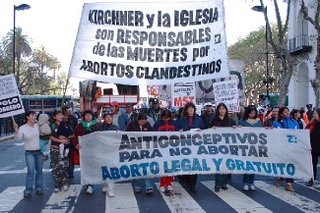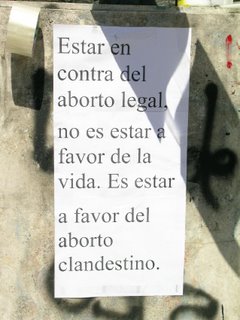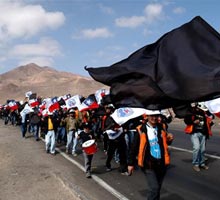Argentine Women Continue to March for Choice!!!

September 28: The Day to Decriminalize Abortion in Latin America and the Caribbean
Across major cities in Argentina from Buenos Aires to Neuquen to Cordoba and La Plata, women marched to make their voices heard. The slogan contines to be, "Contraceptives to not have to abort! Abortion legalized so we don't die!" The movement to legalize abortion in Argentina has grown, as the economic pressures continued to spiral down. At the same time, women have become more confident and the women's movement which grew from women involved in the unemployed movement, has transfered to working women, professionals and college students.
The yearly Women's Conference has also seen a large increase in participation. The first women's conference took place in 1980 with 1,000 women present. In last year's conference in 2005 in the city of Mar de Plata, some 30,000 women participated.
A couple thousand women marched with green handkerchiefs around their necks through the streets of Buenos Aires with a large green banner that covered the width of the street which read: “Not One More Death Due to Illegal Abortion!” The color green has become the color of movement to show you are pro-choice. This year’s XXI Women’s Conference is planned to take place in the city of San Salvador in the northern province of Jujuy from October 14-16, with a sizeable turnout expected. The first women's conference took place in 1980 with 1,000 women present. Last year's conference in 2005 in the city of Mar de Plata, some 30,000 women participated. The 2003 conference launched the “Campaign for Legal and Safe Abortion” which lead to a petitioning campaign across the country. Soon after last year’s conference thousands of women and men marched to the Congress to hand over 100,000 signatures in support of the campaign. This year’s conference will discuss the next steps in the campaign and workshops on a number of topics from equality on the job to the rights of battered women and the struggle to liberate Romina Tejerina.
This year’s XXI Women’s Conference is planned to take place in the city of San Salvador in the northern province of Jujuy from October 14-16, with a sizeable turnout expected. The first women's conference took place in 1980 with 1,000 women present. Last year's conference in 2005 in the city of Mar de Plata, some 30,000 women participated. The 2003 conference launched the “Campaign for Legal and Safe Abortion” which lead to a petitioning campaign across the country. Soon after last year’s conference thousands of women and men marched to the Congress to hand over 100,000 signatures in support of the campaign. This year’s conference will discuss the next steps in the campaign and workshops on a number of topics from equality on the job to the rights of battered women and the struggle to liberate Romina Tejerina.
Freedom for Romina
The demand to free Romina Tejerina has also been backed by a number of women’s rights organizations across Argentina. Tejerina, 22, was raped when she was 18 by a  neighbor. She became pregnant and attempted a self-induced abortion, which was unsuccessful. She later gave birth to the child in her bathroom and drowned it. Soon afterwards, she was arrested was held in jail for a year and a half without charges. She wasn’t provided with any psychological therapy for the first nine months of imprisonment. She was then faced a public trial and then sentenced to 14 years in prison. The man she has accused of raping her remains free. Numerous marches have taken place in her support. A famous Argentine musician, Leon Gieco, has also showed public support for her case, including writing a song about her called Santa Tejerina. Tejerina is currently serving time in prison in San Salvador, Jujuy which is part of the reason the conference is taking place there.
neighbor. She became pregnant and attempted a self-induced abortion, which was unsuccessful. She later gave birth to the child in her bathroom and drowned it. Soon afterwards, she was arrested was held in jail for a year and a half without charges. She wasn’t provided with any psychological therapy for the first nine months of imprisonment. She was then faced a public trial and then sentenced to 14 years in prison. The man she has accused of raping her remains free. Numerous marches have taken place in her support. A famous Argentine musician, Leon Gieco, has also showed public support for her case, including writing a song about her called Santa Tejerina. Tejerina is currently serving time in prison in San Salvador, Jujuy which is part of the reason the conference is taking place there.
Facts and Pressures
In Argentina, abortion is illegal and punishable by time in prison. A court may allow abortion only in the case of rape or if a woman’s life is in danger. On September 27, the day before the march, Buenos Aires’ Health Minister announced that in cases that abortion is not punishable by law, there is no need for the individual or doctors to seek judicial permission. The morning after pill, which was legalized a few years ago, “is now available on demand 24 hours a day, 365 days a year” said Margarita Berkenwald, director of the program for Sexual Health and Responsible Procreation. These are both examples of decisions that come out of the pressure from the women’s movement. At the same time, the government remains quiet to answer the signatures of 100,000 to legalize abortion.
Nonetheless, it is estimated that in Argentina about 4 out of 10 pregnancies are terminated by abortion. According to the country’s health ministry, as many as 500,000 Argentine women have abortions every year. The top cause of maternal death in the country—about 80 percent of such deaths—is complications from abortion. In the last half-decade, hospital admissions from botched abortions have risen substantially in a number of provinces. About 500 women die from such abortions every year, and 16,000 women suffer serious permanent physical damage, according to Gines González García, Argentina’s health minister. Abortion is legal in three countries in South America: Cuba, Puerto Rico and Guyana.
 Left: Pro-choice march in Chile (2004)
Left: Pro-choice march in Chile (2004)
Right: Pro-choice rally in Uruguay (2004)
Learn about the fight to legalize abortion in:
Chile/Uruguay - Colombia







